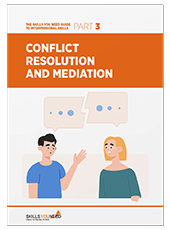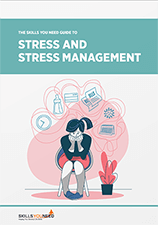6 Tips on How to Separate Professional Criticism
From Personal Feelings
Conflict Resolution
We hear reviews from people every day. Your spouse, children, neighbor or a friend may tell you what they think of your decisions. Your employer may well do the same.
Criticism is a part of life, which can be helpful in reflecting upon yourself. But criticism can also mutate into a tool of mental stress if you can't handle it. It is only through internal reflection that it is possible to detach from taking criticism too personally.
But how can you separate professional criticism from personal feelings?

Do you take boss's criticism personally?
It is not uncommon for employees to feel personally attacked when the boss points out that their work was only rudimentary. Often there is no differentiation that only the work carried out was being reprimanded. Do you also take the boss's criticism personally?
Very often the feelings get mixed up so that they are perceived as personal criticism. The working day is then a black day once again. Even after work, those affected may well fell annoyed by this evaluation by the boss. That night can be plagued by insomnia because these thoughts simply cannot be forgotten allowing rest. There is a rational understanding that this is not a personal evaluation, but it can be emotionally difficult to separate these things.
When colleagues criticize you
There is also strong criticism and evaluation among colleagues. The typical formation of small groups in a team says who is on which side. If you get caught in the crossfire of a group or a colleague, it is difficult because, from now on, almost every move you make will be evaluated. This does not contribute to a relaxed way of working. Who wants to hear that it takes them far too long to get the job done?
But other motives can also play a role among colleagues that are decisive in why you receive negative criticism. People's personal vanities cannot be ignored. Dominance behavior, the feeling of power, strength or superiority are also attributes that explain why you have to be marginalized and accept negative criticism. But how can you deal with all these mental difficulties and what are the solutions to these problems?

The workplace as an arena of power and self-expression
Those who are firmly anchored in their profession can sometimes no longer recognize that the workplace is also a scene. It's about power, your own deficits and self-expression. Instead of suffering from the mental hostility of colleagues, it is better to understand why these attacks occur. Often, such behavior only compensates for one's own deficit. A personal deficit, which cannot otherwise be lived out, is a variant of this.
For example, someone who cannot exercise power in their family or at work, but strives for it, could do so. They grab their colleague and try to exercise power by speaking badly about them, criticizing and evaluating them negatively. Others try to mask their lack of professional competence by pointing to others who are seemingly underperforming. If you point your finger in a different direction, you yourself won't be suspected? This could be a conceivable explanation of such behavior. It is important for you to learn to distance yourself and deal objectively with criticism. Find out how you can do this and which tips could help you.
1. Distance yourself from the criticism
If you are of the opinion that the problem is not yours but the attackers, you should distance yourself from the situation. It is important to examine the situation without immediately accepting the feelings that arise. Be factual and review the criticism as objectively as possible.
2. Be objective when faced with criticism
If the boss rates the work you did as poor, check it out. If that's true, the case is over. But do not absorb the accompanying feelings. The intention to deliver better quality work in the future testifies to an objective perception. But always remember that this complaint relates exclusively to professional performance. This does not mean your character or your personality is inferior.
3. Ignore personal feelings as they arise
However, if your performance has been excellent, you can assume that the boss has a problem today. Sometimes you can just get caught between the lines of a dispute. It is important that you immediately identify negative feelings that are not personal and reject them. If thoughts arise about this again, they should be ignored.
4. Make it clear that you will not accept the criticism
The same applies to colleagues who attack you mentally, evaluate you or treat you unfairly. Experience the situation and let the experience stand in the room. Look at this experience like a third person from the outside. This will enables you to separate your personal feelings better. The emerging negative feelings remain in place regardless. If you want, you can make it clear to your colleague that you will not accept the unjustified criticism.
5. Reject criticism with effective gestures
Effective gestures can also underline this decision not to accept the criticism. The flat, raised hand at chest level, reminiscent of a stop sign, can send clear signals. For you, too, this gesture is an aspect that helps you reflect on the situation. For you, this means: I set myself apart and do not allow myself to be flooded by undifferentiated feelings.
6. Get a bird's eye view
To better understand the situation, it helps to take a bird's eye view. Immediately after the negative experience, try to imagine yourself floating over the room. You look down and can see everyone involved. This includes the spoken words and gestures of the people. And you also see yourself in the scenario.
This form of bird's eye view can provide you with valuable insights. You may recognize their own defensive stance. Or you can see the powerful gestures your colleagues use to set themselves up in front of you. A bird's point of view makes it possible to separate oneself from negative feelings more quickly.
Quick boosters to calm you down
Anyone who receives a negative rating or criticism from the boss or colleague can immediately feel the excitement rising. Before a big discussion starts, you can use a booster to calm down quickly. This also includes autogenic training. There are exercises here for emerging stressful situations that can be carried out quickly and anywhere, such as meditation or yoga.
If possible, try to leave the tense situation in order to answer questions later. This time buffer can be used to perform relaxing breathing techniques and to calm down. In addition, you can prepare yourself inwardly so as not to allow the negative personal feeling to rise. Often, a short exit from the room is enough.
Further Reading from Skills You Need
The Skills You Need Guide to Stress and Stress Management
Understand and Manage Stress in Your Life
Learn more about the nature of stress and how you can effectively cope with stress at work, at home and in life generally. The Skills You Need Guide to Stress and Stress Management eBook covers all you need to know to help you through those stressful times and become more resilient.
About the Author
The author El Maya is a German spiritual medium, karma expert and life coach. She has published books on the soul, life plan, karma and mental health. This guide contains strategies to reduce your karma and find the soul center.


